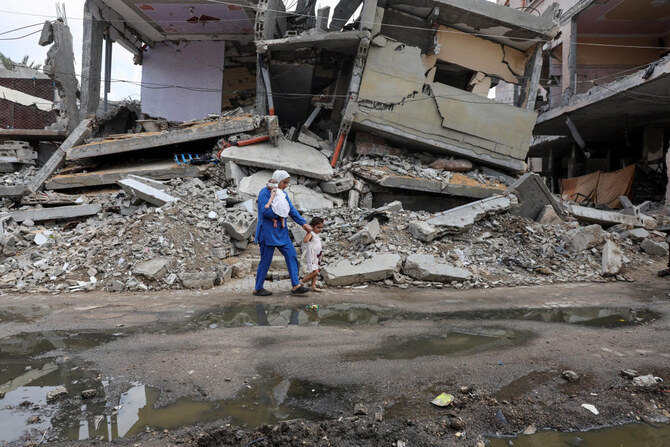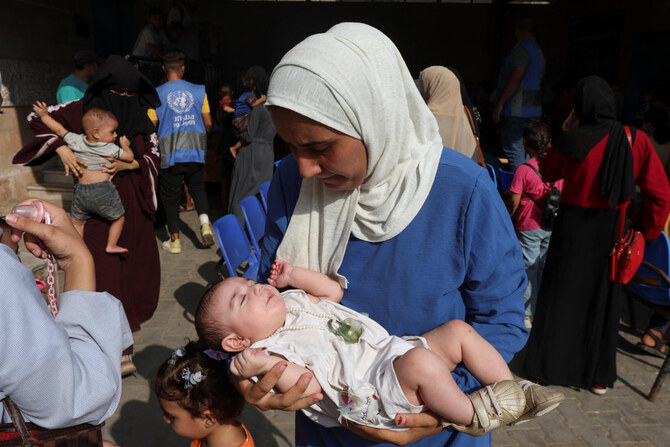CAIRO: Israeli forces killed 33 Palestinians across Gaza in the past 24 hours as they battled Hamas-led militants, Palestinian officials said on Tuesday, but brief pauses in fighting allowed medics to conduct a third day of polio vaccinations for children.
Among those killed were four women in the southern city of Rafah and eight people near a hospital in Gaza City in the north, the Palestinian Civil Emergency Service said. Others were killed in separate air strikes across the territory, it said.
The Israeli military said it killed eight Palestinian gunmen, including a senior Hamas commander who took part in the Oct. 7 attacks in Israel, at a command center near the Al-Ahli Arab Hospital in Gaza City.
A statement said Ahmed Fozi Nazer Muhammad Wadia had taken command of a “massacre of civilians carried out by Hamas terrorists” in Israel’s Netiv HaAsara community near the Gaza border. There was no response from Hamas.
The armed wings of Hamas and Islamic Jihad said they were battling Israeli forces in the Zeitoun suburb of Gaza City, and also in Rafah and Khan Younis in the south.
Nevertheless, the World Health Organization (WHO) said that it was ahead of its targets for polio vaccinations in Gaza on Tuesday, day three of a mass campaign, and had inoculated about a quarter of children under 10.
The campaign, which was hastened by the discovery of the first polio case in a Gazan baby last month, relies on daily eight-hour pauses in fighting between Israel and Hamas militants in specific areas of the besieged enclave.
Diplomatic efforts to secure a permanent ceasefire and release foreign and Israeli hostages held in Gaza and return many Palestinians jailed by Israel have stalled, however.
Israeli Prime Minister Benjamin Netanyahu said on Monday that Israeli troops would remain in the Philadelphi corridor on the southern edge of Gaza, one of the main sticking points in reaching a deal to end the fighting and return hostages.
Hamas, which wants an agreement to end the war and see Israeli forces out of all of the Gaza Strip, says such a condition, among some others, would prevent a deal. Netanyahu says war can only end when Hamas is eradicated.
POLIO CAMPAIGN
The United Nations, in collaboration with the local health authorities, embarked on the third day of a complex campaign to vaccinate around 640,000 children in Gaza.
Rik Peeperkorn, WHO representative for the Occupied Palestinian territories, told reporters in Geneva that it had vaccinated more than 161,000 children under 10 in the central area in the first two days of its campaign, compared with a projection of around 150,000.
“Up until now things are going well,” he said. “These humanitarian pauses, up until now they work. We still have 10 days to go.” He said that some children in southern Gaza were thought to be outside the agreed zone for the pauses and that negotiations continued in order to reach them.
Palestinians say a key reason for the return of polio is the collapse of the health system and the destruction of most Gaza hospitals. Israel accuses Hamas of using hospitals for military purposes, which the Islamist group denies.
The war in Gaza was triggered by Hamas’ Oct. 7 rampage in southern Israel, when its fighters killed 1,200 people and captured more than 250 hostages, according to Israeli tallies.
Since then, more than 40,800 Palestinians have been killed in Gaza, the enclave’s health ministry said on Monday.




























